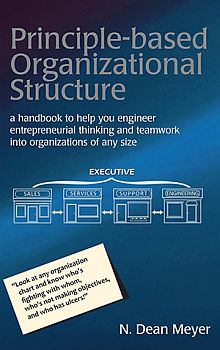Excerpt from www.NDMA.COM, © 2026 N. Dean Meyer and Associates Inc.

Analysis: Why Great Processes Alone Aren't Enough
well engineered processes and best practices won't work in a badly designed organizational structure
by N. Dean Meyer
Some executives believe that carefully engineered business processes are the key to success. They argue that as long as everybody does their part in well-designed processes, an organization will perform well.

This is problematic for at least three reasons:
- The effectiveness of processes depends on the organizational structure.
If nobody in the organization specializes in a given discipline, processes which depend on that competency will fail. It's the job of structure to make available specialists in every needed discipline.
- Structure can override processes.
Processes don't work well when they ask people to do things at odds with their job descriptions. When staff are caught between conflicting forces, they'll optimize their performance appraisals. They'll follow their job descriptions, even if that causes some processes to fail. (It's always easy to blame others involved in the process for the failure!)
- Predefined processes only make sense when work is highly structured and routine -- the kind of work you can flow-chart, and people follow that procedure every day.
But most jobs require much more than people performing routine tasks on a well-engineered assembly-line. In functions where flexibility and innovation are critical components of success, simply giving everybody a clearly defined role in a process makes the organization more rigid and less creative.
The truth is, great people working within great processes can't perform well unless the structure they live in is well designed.
A better answer is to define an organization chart containing all the needed specialties. Then, overlay a "meta-process" for flexibly drawing the right specialists onto teams and defining the team's process in the context of the unique requirements of each project or service.
|


